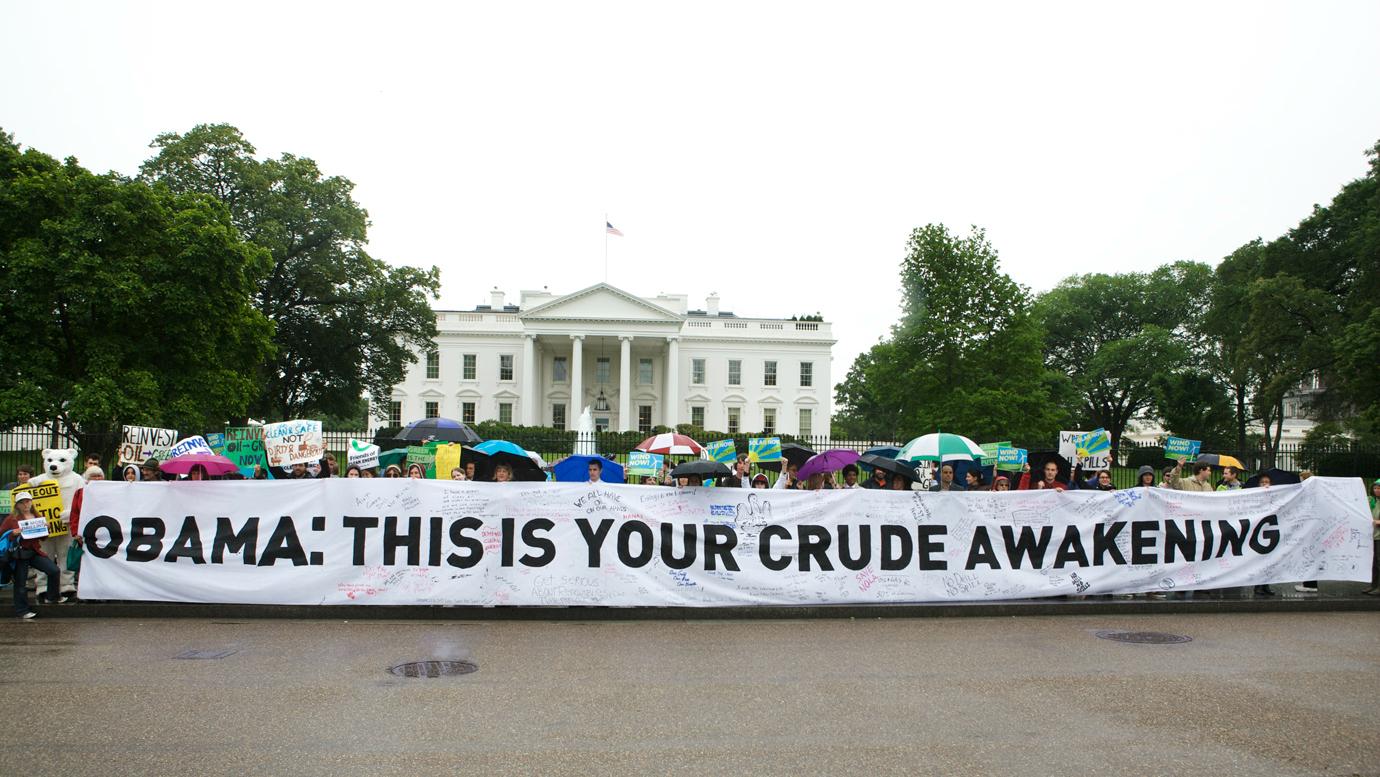In its ongoing effort to make life difficult for environment reporters, the Obama administration once again announced major environmental news on a Friday. This time, however, it was not a measure to protect the environment, but to destroy it. The Department of Interior decided to allow seismic testing off the southern Atlantic coast from Delaware to Florida. This is a precursor to possible oil and gas drilling, to determine what fossil fuel resources are there.
It is an illustration of one of Obama’s biggest failures on climate change. And it points to the direction that environmentalists need to go next: call for a moratorium on all federal leasing for fossil fuel development.
Green groups and green leaders in Congress attacked Interior’s move. Sen. Sheldon Whitehouse (D-R.I.), a top climate hawk, issued a statement saying, “it just doesn’t seem worth putting our oceans and coasts at risk.” The NRDC called the decision “a major assault on our ocean.”
There are four big reasons to oppose this seismic testing:
1. Damage to marine life from testing. Seismic testing involves blasting underwater with air guns, creating dramatic sound waves that can travel thousands of miles. As Grist’s John Upton noted in February, when the Bureau of Ocean Energy Management released its preliminary report on this plan, 34 marine mammal species that use sound to navigate could be harmed, and many animals could be killed. The government’s own assessment said more than a million bottlenose dolphins could be hurt every year, along with a number of endangered whales.
2. Damage to marine life, oceans, and coastlines from drilling. If offshore oil and gas drilling does happen in the region, it will cause pollution of the oceans and degradation of fisheries and coastlines, possibly damaging local fishing and tourism industries. Small spills are just business as usual for the oil industry.
3. Possible disaster. Offshore drilling creates the risk of a big oil spill that could devastate an entire ecosystem. The Obama administration was actually taking steps toward allowing offshore drilling along the Atlantic coast in the spring of 2010, but then the Deepwater Horizon explosion happened in the Gulf of Mexico and plans were put on hold.
4. And, of course, climate change. Obama has publicly committed to fighting climate change caused by fossil fuels, and yet he approves the extraction of more fossil fuels. By allowing this extraction on public lands and in federally controlled oceans, he is essentially subsidizing fossil fuel consumption and contributing to more climate change.
“It’s completely inconsistent with this ambitious climate policy they’ve announced to then turn around and say, ‘Well, we might allow drilling,’” says Athan Manuel, director of the Sierra Club lands protection program.
The huge increase in oil and gas production during Obama’s tenure may make his record on allowing drilling seem worse than it is. Most of the fracking boom is actually occurring on private land. “This president has been pretty good when it comes to leasing public lands for oil and gas in particular,” says Manuel. “But to allow seismic testing is inconsistent with what he’s done in the past.”
The Interior Department’s latest move is especially bizarre because early in Obama’s first term, when there was still hope for Congress passing climate change legislation, granting offshore drilling leases was supposed to be part of what Obama offered Republicans and conservative Democrats from states like Virginia in exchange for their votes. Now Republicans control the House of Representatives, climate change legislation has no chance, and Obama will get nothing in return for this. The only stakeholders who are pleased by the announcement are industry groups like the American Petroleum Institute, which never have done, and never will do, any favors for Obama.
And that is why Obama should be rejecting any and all fossil fuel extraction from federal lands and waters. Trading drilling rights for an economy-wide price on carbon would be a deal worth making. But there is no deal to be made right now. And in any potential future deal, the Democrats’ hand would be strengthened by holding exploration and leasing rights as a bargaining chip.
There has been some debate in recent years over the environmental movement’s priorities. Some center-left pundits, such as New York magazine’s Jonathan Chait, argue that Obama has done just about everything he can do without congressional action to address climate change, and that the focus on the Keystone XL pipeline instead of stronger power plant regulations has been misplaced.
Well, here is something Obama should be doing differently, something fully within his power to control: stop issuing leases for fossil fuel extraction. It is no less important than Keystone. Indeed, it is absurd that we hand out permission to for-profit companies to despoil our shared lands and waters. The executive branch is charged with managing these areas in the public interest, and the public’s greatest interest — economically as well as environmentally — is in reducing climate change.
The environmental community should be calling on Obama not to issue a single new lease offshore or on federal land. Environmental activists say this is a great idea, just waiting for a catalyst. “Putting a moratorium in place would be a major step forward on climate. It’s a campaign waiting to happen,” says Jamie Henn, spokesperson for 350.org, which has led the fight on Keystone. Henn proposes a sort of middle ground: that Obama could take climate impact into account for all new leasing proposals. “President Obama could start by applying his Keystone XL climate test to any new developments: They can only proceed if they don’t significantly contribute to global warming.”
That would be a step in the right direction. But, given the local environmental and public health impacts of oil and gas drilling and coal mining, there is good reason prevent it even if the climate impact is relatively minor.
Could a movement to stop federal fossil fuel leasing become a reality? In 1983, the environmental community successfully lobbied Congress to place a moratorium on offshore Atlantic drilling, which was renewed until 2008. The Sierra Club has considered trying to revive it, but found the enthusiasm among donors to be lacking. While the group has consistently opposed all leasing in recent years, it hasn’t been running a unified campaign for a moratorium. “It’s been harder than you’d think to raise money and build a national coalition,” says Manuel.
It may be easier to mobilize for such a campaign when there is an anti-environment administration to serve as a villain. “We haven’t been able to raise the money and build a coalition to keep that campaign going. In the ‘80s we were able to, maybe because of James Watt,” says Manuel, referring to Ronald Reagan’s notorious interior secretary. “Maybe that’ll happen eventually.”
A few years ago, no one would have thought that a mass mobilization against Keystone was likely either. But groups organized, donors got excited, volunteers mobilized, and the rest is history. As on Keystone, Obama won’t do the right thing on leasing unless he is forced to.




